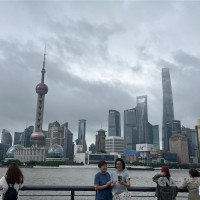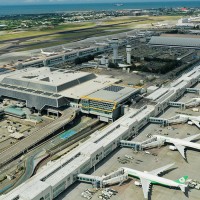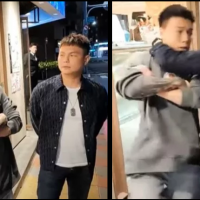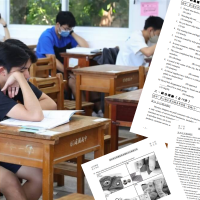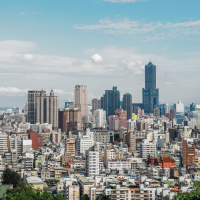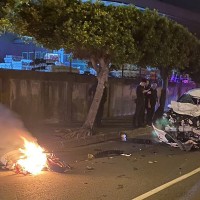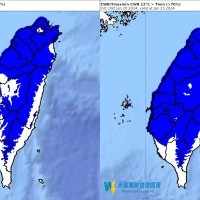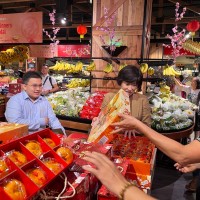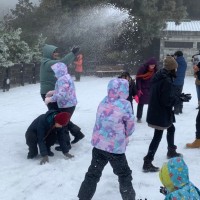TAICHUNG (Taiwan News) — Three days before the general election on Saturday (Jan. 13), DW News released an interview with former President Ma Ying-jeou (馬英九) that does a superb job of drawing out the former president’s thoughts and opinions on key issues related to the Kuomintang (KMT) and their presidential candidate Hou Yu-ih's (侯友宜) campaign, relations with China, a timeline for unification with China, national defense and relations with the United States among other things.
Ma, speaking excellent English, was candid and forthcoming, much to the horror of the KMT and Hou.
Ma laid bare what many in his party really think, not what they campaign on, which was so embarrassing to the KMT that they disinvited Ma from attending the final election rally. While much of what he said was not new, what was remarkable about this interview is that it was all concentrated together in just over 30 minutes.
The quote that dominated the headlines was in response to a question asking if China’s leader Xi Jinping (習近平) could be trusted, to which Ma replied “as far as cross-strait relations, you have to.” Just prior to that, when asked “is Xi Jinping a dictator, as Joe Biden put it,” Ma laughed and said, “Well, it depends on how you defend it, that term doesn’t mean very, not very important in the cross-strait relations because we have to create a situation that we can deal each other peacefully without having to use force and that is probably more important than any other rhetoric you have.”
Ma came out against extending conscription from four months to one year, and against raising the military budget because “we can’t win” because “mainland China is too big” and noted that his administration did not spend very much on the military. He also said that he did not think Xi was trying to push “reunification.”
Ma made it plain he did not think the United States would defend Taiwan, despite it being pointed out to him that U.S. President Joe Biden has said he would four times. Additionally, he said the Democratic Progressive Party (DPP) bore more of the responsibility for cross-strait tensions and referred to President Tsai Ing-wen’s (蔡英文) comment that “Mainland China” and Taiwan do not belong to each other as a “typical secessionist move.”
'Reunification' acceptable to Taiwanese
He also said that “reunification” could be acceptable to the Taiwanese because of the constitution, but that it would require consensus and would take many years to achieve.
While all of those comments have been made in various forms in various settings, there was one thing that as far as I know is new, and is a bombshell. Ma claimed that the “1992 consensus” was reached in 1996 at about the 19-minute mark in the interview. That goes against both the KMT’s stated timeline as well as his previous comments.
Does it matter what a retired former president thinks? It absolutely does.
First, in the interview he explained what he really thinks, which explains a lot about how he governed, which was very different from what he campaigned on. Within the KMT Ma is viewed as the master of cross-strait policy and revere him to this day.
Second, because Hou Yu-ih has repeatedly said that in cross-strait relations he plans to follow on from where Ma left off, the KMT has all but admitted that previously Hou did not know a lot about the issue, but went to Ma to learn from him as well as the KMT think tank.
Following Ma's path
Hou is campaigning on many of the same things that Ma did, while simultaneously promising to do what Ma did in power, which were not the same things. By Ma laying bare what he actually thinks and how he really approaches many key issues he contracted what Hou is campaigning on, while at the same time explaining how Hou would govern in practice if Hou is telling the truth about following in Ma’s path.
On the campaign trail, Ma touted a strong national defense and promised to raise defense spending to 3% of GDP. He said he would open dialogue with China, strive for peace and to open the economy to China to boost Taiwan’s economy. He spoke of respecting the constitution, that the Cabinet should answer to the Legislative Yuan, said there should be greater cooperation in the region, and pledged "no unification, no independence and no use of force," all of which he spoke of in his inaugural address as well.
Sound familiar? It should, Hou is campaigning on all of those things. Though Hou would probably use somewhat different wording, Ma’s inaugural address could easily encapsulate what Hou stands for.
In practice once in office, Ma cut military spending year after year and by the end of his administration, direct defense spending had dropped to below 2% of GDP. In the interview, Ma explained at length why he felt it was not necessary to spend very much on defense.
Cutting defense spending was just one of the ways Ma was preparing for eventual annexation. His initial steps were not necessarily risky, such as opening direct transportation links with China and the trade pact signed in goods.
The wide opening to Chinese tourists and students did potentially pose some risks and could have allowed, and probably did, a fair number of Chinese agents and soldiers to set up camp in Taiwan. These can be activated in the event of a war to conduct assassinations, attack key infrastructure, lay the groundwork for Chinese paratroopers, and generally disable Taiwan from within. Hou wants to revive this.
Destroying Taiwan from within
The crowning achievement of the Ma administration was supposed to be the Cross-Strait Service Trade Agreement (CSSTA) that was negotiated with China and sent to the legislature for ratification. After using their parliamentary majority in committee they rushed approval through to ready it for a general floor vote to pass it into law.
The floor vote never happened as hundreds of activists occupied the legislature. Soon they were joined by tens and sometimes hundreds of thousands of people in what became known as the Sunflower Movement. The public had finally realized what was in the CSSTA and put a stop to it.
If it had passed, 64 sectors of the economy would have been opened to China. These included publishing, advertising, telecommunications, transportation, tourism, and financial services including insurance, banking, construction services, health services, storage and warehousing, courier services, technical testing and analysis, freight transport, and even funeral parlors, and movie theaters.
In China there is a blurry line between the state and the private sector and many of the biggest Chinese companies are partly or totally owned by the state. Chinese Communist Party (CCP) cells must be in all but the smallest companies, and all companies must follow the directives of the CCP if ordered and by law must hand over information requested, regardless of physical location.
This means the CCP could have bought out much of Taiwan’s media and influenced the rest through advertising budgets. They would have had access to just about any information they could want on anybody, including cell phone records, health records, and financial records, making blackmail and extortion common.
They would have had access to key infrastructure, public and private, and with the right agents would have been in a position to disable them. The CCP would have easily been able to prime Taiwan for invasion by causing Taiwan to collapse from within.
Hou-Ko want to open Taiwan
Hou Yu-ih wants to revive this pact, as does Taiwan People’s Party leader Ko Wen-je (柯文哲). Even if he is serious about national defense, the CSSTA would open Taiwan up to massive infiltration that no tanks or planes could stop.
Hou has tried to distance himself from Ma’s interview and now after months of saying he would follow Ma’s path is abruptly claiming to have “different views.” Perhaps he does, but with his lack of knowledge of cross-strait affairs, he is going to have to stock a Hou administration with figures from the KMT. Most of them would likely have served in the Ma administration.
Unlike the KMT following the Chinese Civil War through to the 1990s, the modern KMT does not understand how treacherous, villainous, cruel, and dishonest the CCP really is. There will be no true peace as long as the CCP remains in power.
The CCP will only agree to grant concessions under one of two conditions. Either in exchange for concessions on sovereignty or in exchange for leverage that will allow them to undermine Taiwan's sovereignty.
The KMT wants to grant them both in exchange for promises that the CCP will only honor as long as it suits them. The CCP never negotiates in good faith, and never will.
Opening Taiwan to the CCP via the CSSTA does not make Taiwan less likely to be invaded by China, rather it makes it exponentially more likely by making it far easier and less costly. You do not give a serial killer the keys to your house in exchange for easily broken promises, and the CCP has ruled over the most murderous state in history.
Some students from Hong Kong once interviewed me and asked if China were to occupy Taiwan would the model for their rule be Hong Kong? I said no, it would be Xinjiang (East Turkestan). Taiwanese are too freedom-loving and have a large enough territory to carry out resistance and could not be controlled without extreme measures.
Both Hou and Ko do not appear to understand the existential risks involved in reviving the CSSTA. Hopefully, the voters do.








